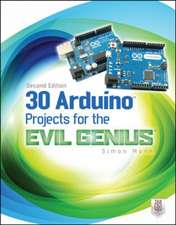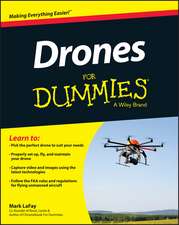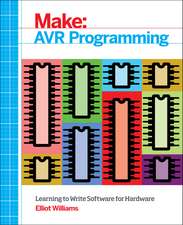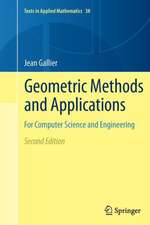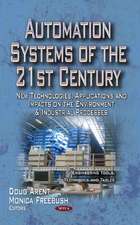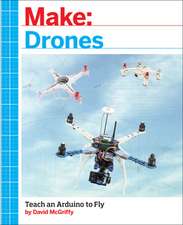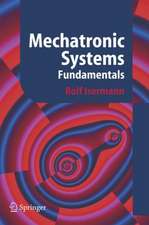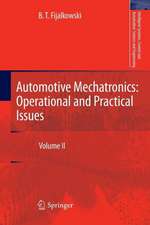Robust Control: The Parameter Space Approach: Communications and Control Engineering
Autor Jürgen Ackermannen Limba Engleză Hardback – 26 iul 2002
| Toate formatele și edițiile | Preț | Express |
|---|---|---|
| Paperback (1) | 954.14 lei 6-8 săpt. | |
| SPRINGER LONDON – 22 sep 2012 | 954.14 lei 6-8 săpt. | |
| Hardback (1) | 1395.94 lei 6-8 săpt. | |
| SPRINGER LONDON – 26 iul 2002 | 1395.94 lei 6-8 săpt. |
Din seria Communications and Control Engineering
- 15%
 Preț: 659.70 lei
Preț: 659.70 lei - 20%
 Preț: 879.74 lei
Preț: 879.74 lei - 18%
 Preț: 953.65 lei
Preț: 953.65 lei - 18%
 Preț: 1117.03 lei
Preț: 1117.03 lei - 9%
 Preț: 1385.77 lei
Preț: 1385.77 lei - 18%
 Preț: 1128.08 lei
Preț: 1128.08 lei - 18%
 Preț: 953.65 lei
Preț: 953.65 lei - 15%
 Preț: 656.89 lei
Preț: 656.89 lei - 18%
 Preț: 896.52 lei
Preț: 896.52 lei - 18%
 Preț: 1113.26 lei
Preț: 1113.26 lei - 18%
 Preț: 1388.22 lei
Preț: 1388.22 lei - 15%
 Preț: 647.27 lei
Preț: 647.27 lei - 18%
 Preț: 954.45 lei
Preț: 954.45 lei - 18%
 Preț: 1231.47 lei
Preț: 1231.47 lei - 18%
 Preț: 948.92 lei
Preț: 948.92 lei - 18%
 Preț: 1232.57 lei
Preț: 1232.57 lei - 18%
 Preț: 1127.28 lei
Preț: 1127.28 lei - 15%
 Preț: 643.34 lei
Preț: 643.34 lei - 18%
 Preț: 1401.30 lei
Preț: 1401.30 lei - 15%
 Preț: 651.51 lei
Preț: 651.51 lei - 20%
 Preț: 1454.07 lei
Preț: 1454.07 lei - 18%
 Preț: 948.79 lei
Preț: 948.79 lei - 18%
 Preț: 1233.06 lei
Preț: 1233.06 lei - 18%
 Preț: 947.85 lei
Preț: 947.85 lei - 18%
 Preț: 950.96 lei
Preț: 950.96 lei - 18%
 Preț: 956.99 lei
Preț: 956.99 lei - 15%
 Preț: 644.18 lei
Preț: 644.18 lei - 18%
 Preț: 946.87 lei
Preț: 946.87 lei - 18%
 Preț: 951.14 lei
Preț: 951.14 lei - 18%
 Preț: 961.55 lei
Preț: 961.55 lei - 15%
 Preț: 644.18 lei
Preț: 644.18 lei - 20%
 Preț: 990.80 lei
Preț: 990.80 lei - 18%
 Preț: 1006.72 lei
Preț: 1006.72 lei - 18%
 Preț: 942.44 lei
Preț: 942.44 lei - 18%
 Preț: 1233.06 lei
Preț: 1233.06 lei - 15%
 Preț: 641.85 lei
Preț: 641.85 lei - 18%
 Preț: 957.75 lei
Preț: 957.75 lei - 15%
 Preț: 649.87 lei
Preț: 649.87 lei - 18%
 Preț: 958.07 lei
Preț: 958.07 lei - 18%
 Preț: 1117.99 lei
Preț: 1117.99 lei - 18%
 Preț: 781.62 lei
Preț: 781.62 lei - 18%
 Preț: 953.20 lei
Preț: 953.20 lei - 18%
 Preț: 1109.78 lei
Preț: 1109.78 lei
Preț: 1395.94 lei
Preț vechi: 1702.38 lei
-18% Nou
267.20€ • 290.33$ • 224.59£
Carte tipărită la comandă
Livrare economică 22 aprilie-06 mai
Specificații
ISBN-10: 1852335149
Pagini: 496
Ilustrații: XIII, 483 p.
Dimensiuni: 155 x 235 x 37 mm
Greutate: 0.87 kg
Ediția:2nd ed. 2002
Editura: SPRINGER LONDON
Colecția Springer
Seria Communications and Control Engineering
Locul publicării:London, United Kingdom
Public țintă
ResearchCuprins
* Parametric Plants and Controllers: A Crane Example* Boundary Crossing and Parameter Space Approach* Eigenvalue Specifications* Boundary Mapping in Parameter Space* Frequency Domain Analysis and Design* Case Studies in Car Steering* Case Studies in Flight Control* Robustness Analysis by Value Sets* Values Sets for Non-linear Co-efficient Functions* The Stability Radius* Robustness of Sampled-Data Control SystemsA Polynominals and Polynominals Equations, Resultant MethodB Introduction to PARADISEBibliography
Recenzii
This is the second edition of the previously published text Robust Control which appeared in 1993. The new edition represents a total revision of the previous text, resulting in a book that is easily readable and well organized. A large number of real world examples and a step by step introduction of the material make the text easily accessible. The more than 300 figures and the many discussed applications give the book a very intuitive and graphics oriented flavor.
In summary, this book takes a refreshingly different look at the problem of robust control than most other texts. It provides an easy to follow coverage of the material and is largely self-contained. This book should be of significant interest to the automatic control community, and it is especially valuable for the practicing control engineer.
IEEE Transactions on Automatic Control 50 (2005) 1229 – 1230 (Reviewer: Peter Bauer)
"This monograph addresses the problem of robust control ... . The text presents several interesting case studies that illustrate the presented methods … . A large number of real world examples and a step by step introduction of the material make the text easily accessible. The more than 300 figures and the many discussed applications give the book a very intuitive and graphics oriented flavor. … this book takes a refreshingly different look at the problem of robust control than most other texts." (Peter Bauer, IEEE Transactions on Automatic Control, Vol. 50 (8), August, 2005)
Notă biografică
Jürgen Ackermann studied Control Engineering under the guidance of Prof. Oppelt in Darmstadt, and Control Theory under the guidance of Prof. Jury in Berkeley, California. He is well known for his contributions to the theory of control systems, as treated in his books on sampled-data [7] and robust control systems [10]. Perhaps his best known result is Ackermann´s formula for pole placement [38].
J. Ackermann has a long association with DLR, the German Aerospace Center in Oberpfaffenhofen, Germany, where he was director of the Institute of Robotics and Mechatronics from 1974 to his retirement in 2001. He has attracted to the institute and supported such well known members of the international control and dynamics community as G. Hirzinger, W. Kortüm, G. Grübel, R. Schwertassek, K. Well (now Stuttgart) and G. Kreisselmeier (now Kassel). Together with them he has initiated and guided many applied research projects which include robust autopilots and jet engine control systems for aircraft; trajectory optimization of aircraft, missiles and spacecraft; control of large flexible structures; robotics for space and manufacturing application, modelling and control of trains, maglev vehicles and automobiles.
He has developed a general theory of robust control for steering of vehicles. It is based on robust triangular decoupling of steering of a point mass along a desired trajectory and automatic control of undesired vehicle rotations. J. Ackermann holds six patents for robust feedback control strategies to increase the safety of car driving [1-6]. He initiated an experimental program with BMW, which has shown spectacular safety advantages in road tests with side-wind and mu-split braking [110]. The concept was transferred to flight control [146] where it resulted in a remarkable weight reduction. In both cases the advantages resulted from the fact, that an automatic control system can compensate strong disturbance torques faster than the driver or pilot.
J. Ackermann was a Member of the IFAC Council (1990-1996), where he initiated the creation of a new Technical Committee on Automotive Control. He is a founding member of the European Union Control Association and was a member of the IEEE-CSS Board of Governors (1993-1995) and of the "Beirat" of GMR (the German IFAC-NMO). He served on the Editorial Boards of Automatica, IEEE Transactions on Automatic Control (as Associate Editor at Large), C-TAT, Robust and Nonlinear Control, Automatisierungstechnik and was Guest Editor for special issues on "Robust Control" and "Automotive Control". He was chairman of the IPC for the 1989 IEEE International Conference on Control and Applications (Jerusalem), and chaired an IEEE Award Committee, the IFAC Nichols medal committee and the Theory Committee of GMR. He was also a Member of the Senate of the DLR (1986-1998) and of the Advisory Board of the "Deutsches Museum" in Munich (1986-1998). From 1988 to 1995 he was elected chief reviewer for Control Engineering for the Deutsche Forschungsgemeinschaft. Presently he is chairman of the IFAC awards committee for the Nichols medal.
J. Ackermann received the J. M. Boykow-Award (1970), the VDE Best Publication Award (1973), he is an Otto-Lilienthal-Fellow (1989) and an IEEE-Fellow (1992), he is recipient of the first Nichols medal of IFAC "for robust control design methods and their use to improve automobile safety" (1996). Also in 1996 he received the Bode Prize of IEEE. In 2005 he was appointed IFAC Fellow "for outstanding and extraordinary contributions to the field of automatic control and involvement in IFAC activities in the promotion of the field". He is adjunct professor at the Technical University Munich and has held visiting appointments at Urbana-Champaign, Canberra, Irvine, Berkeley and Stanford. He was invited for numerous plenary keynote lectures at international conferences [11-26].
Textul de pe ultima copertă
New results, fresh ideas and new applications in automotive and flight control systems are presented in this second edition of Robust Control. The book presents parametric methods and tools for the simultaneous design of several representative operating conditions and several design specifications in the time and frequency domains. It also covers methods for robustness analysis that guarantee the desired properties for all possible values of the plant uncertainty. A lot of practical application experience enters into the case studies of driver support systems that avoid skidding and rollover of cars, automatic car steering systems, flight controllers for unstable aircraft and engine-out controllers. The book also shows the historic roots of the methods, their limitations and research needs in robust control.
Caracteristici
Single example system (a crane) used throughout shows the reader how the methods presented work in a comparable fashion of gradually increasing complexity
PArametric Robustness Analysis and Design Interactive Software Environment MATLAB® toolbox helps the reader to investigate further and to implement the methods described
Descriere
Robustness analysis addresses the question "Is a control system sufficiently stable under all admissible operating condtions?"
Robust Control (second edition) presents parametric methods and tools for control design catering for several representative operating conditions and design specifications simultaneously, thus reducing the performance effects of parameter uncertainty in both time and frequency domains. The author’s graphical parameter space methods guarantee the desired properties for all possible values of plant uncertainty. These methods also help the reader to deal with unstructured disturbances being particularly well-suited for sequences of design steps each having a few uncertain parameters. Kharitonov and edge results and tree-structured decompositions deal with simple structures with many uncertain parameters. Scalar measurement for the distance from an instability and the robustness of sampled-data control are introduced.
• In addition to a general large-scale rewriting and editing of existing material, the following specific changes are featured in the second edition:
• new results, in particular on frequency-domain specifications for unstructured uncertainties and disturbances, on PID controller design and on singular frequencies;
• new chapters dealing with novel applications in car steering (skid and rollover avoidance and automatic steering) and flight control (flutter suppression and engine-out control for unstable aircraft in divers operating conditions);
• streamlined more didactic presentation;
• author-created downloadable Paradise MATLAB® toolbox with detailed commentary in an appendix.
Requiring only an undergraduate background in feedback control, Robust Control (second edition) keeps the mathematics of an important subject simple. The book shows mechanical and electrical engineers who have to design robust mechatronic systems how to adapt its new tools to solve their problems and its solid theoretical development based on historical foundations will be of profit to the control systematician.

